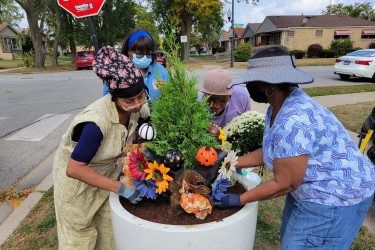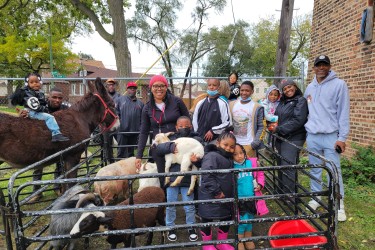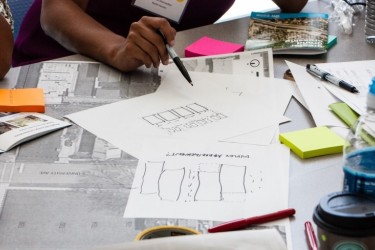NEIGHBORHOOD GRANTS FAQS
General Questions
These are small grants that fund community-based projects in our two focus neighborhoods of West Pullman and Greater Grand Crossing. Projects must focus on physical or social improvements in the community.
There are three tiers of funding. The first tier is up to $1,500 aimed at projects such as block club parties, small beatification projects, and back to school drives. The second tier is up to $3,000 aimed at projects that include permanent block improvements, community festivals, and workshops. The third tier is up to $5,000 and is only awarded for multi-day events or programs. Ultimately, grant funding will depend on the actual costs associated with your project. It is important to create an accurate materials list and budget when you apply for your project, because this will influence the amount of your grant award. The goal here should be to request enough funds to be able to successfully execute your project (materials, food, tools, fees, etc.) while also being aware of how you can use funds efficiently so that the most amount of neighborhood groups as possible can participate in the program.
Your projects should be driven by the people on your project team rather than by Habitat Chicago. We will provide the funding for your project, as well as information about additional resources, but we will not be able to supply volunteers, materials, or services such as ordering materials.
No. These projects are about you and your project team, not Habitat Chicago. You do not need to promote Habitat Chicago at any point during your project’s planning or execution. However, if you do find that you and your team want to include the Habitat Chicago logo on any materials related to your project, let us know and we would be happy to send you our logo.
Yes. It’s okay to receive funding for your project from other sources outside of Habitat Chicago. This may include other grants, business donations, in-kind goods, or group member contributions, for example. We want your project to be successful, and encourage you to get creative with your funding sources when it’s beyond the scope of what our grants program can cover alone.
Application Process Questions
You can apply for a grant directly through our online form. However, before getting started on your application, we recommend reading through our website information and watching our application instructions video.
We ask that all project groups submit their applications through our online form. However, if you are experiencing difficulties with the form, let us know and we will work with you to ensure your application is successfully submitted.
You can email neighborhoods@habitatchicago.org or call our main office number (312) 563-0296 and ask to be connected to one of our Neighborhood Grants Initiative team members.
Attendance at one of our information sessions is recommended for new applicants. We offer multiple information sessions each year, and while attendance is not required to submit a grant application, it is a great opportunity to connect with our staff and clarify any questions you may have. The information sessions are short, virtual events that discuss the program’s structure, requirements, and how to apply, with time for Q&A at the end. Find and register for the next available information session on our events page.
Project groups should submit their applications at least 45 days in advance of when they will require funding. This is because our application review process can take up to 10 business days, and if your application is approved for funding, the grant set up process can take up to an additional 21 days. Applying early is the best way to ensure that you will have access to your funds when you need them. However, please keep in mind that we will not review applications that are submitted more than 4 months in advance of their project start date.
Your budget is an important part of your application that helps our team determine actual grant awards. Each line item you include paints a picture for us, so the more detail you include, the better our application review team will be able to understand the scope of your project. The detail in your budget also demonstrates that you’ve thought your project idea through and have developed a plan for how you will make it happen, which increases your chances of approval.
If you’re not sure what specific line items to include in your budget, start by creating a list of all the materials and/or services you think you will need to complete the project, then get someone else to look at the list. Different knowledge sets will help fill out a more complete list. Once you’ve got your list, look online or in-stores for the prices of those items. Record your findings on a spreadsheet or table for easy tracking and counting, and don’t forget to include taxes and any delivery fees.
Grants are awarded on a first come, first served basis to project applications that meet a certain rating threshold, until all funds are exhausted. Applications are scored according to the following criteria:
>>Detail and thoroughness of the application responses
>>Detail and clarity of the project application's budget
>>Strength of the project group’s plan for on-time and on-budget completion
>>Extent to which the project positively impacts the neighborhood
>>Extent to which the project brings the community together
>>Extent to which the project enhances the physical environment
Please note that it’s rare for a project to tick every box, especially in regards to the bottom half of the list. The criteria listed above are meant to be varied enough to allow for approving many different types of projects. So, don’t worry too much, for example, if your project doesn’t have a physical component if all of the other areas are strong. It will balance out and likely reach our threshold for approval.
If your project is not approved for funding, we will work with you to improve your chances of approval if you choose to resubmit with adjustments.
Eligibility and Requirements Questions
We understand that community stakeholders can be involved in a neighborhood in a variety of ways beyond living there, and, as such, anyone can apply for a grant as long as their project takes place in West Pullman or Greater Grand Crossing. However, we do strongly prefer project groups who have a direct tie to the neighborhood and incorporate residents.
Due to the small nature of these grants, we are unable to fund costly projects such as significant home repairs. Because there is a limited pool of funds available each year, and the goal is to fund multiple projects, large projects that only impact a few households will not to be approved.
The projects funded through Neighborhood Grants are meant to affect the physical or social aspects of your neighborhood. While improving the inside of your home would benefit you, we want these projects to have a visual or social impact the whole community can enjoy. In order to maximize the impact of these grants, we ask that any repair projects take place in areas where the community has access to (i.e. churches).
Yes. We realize that you might not be able to do everything on your own and that some projects may require you to hire someone. Whether it’s a carpenter or a DJ, you can include their service fees on your application’s budget, as long as the payee is not associated with a group member’s business or family. Getting a quote from a specific organization or individual in advance will give you a better idea of how much their services will actually cost for your project. Keep in mind that if your project is approved for funding, you will need to provide valid receipts for any services rendered in your final expense report.
There is no limit to the amount of grants you can be awarded in a year. Since this program accepts applications on an ongoing basis, you can apply at any point in the year and take on as many consecutive projects as you’d like. If your project is approved for funding, you will be required to close out that project fully before applying for funding for the next project.
Group Formation Questions
All of your neighbors inherently have a stake in the community and its development by living where they do. If you don’t know your neighbors, we strongly suggest starting open-ended conversations rather than trying to involve them after you are set on a project idea. Start by trying to recruit 1-2 neighbors to the discussion, and use connections they may have with other neighbors to expand from there. When you’re just starting, don’t worry about trying to form a giant group; remember, you don’t have to be a part of a large group to make an impact. Start the conversations by soliciting hopes and dreams for your block/neighborhood and see what commonalities you identify as a group. Feel free to explore our Past Projects page to add inspiration to the conversations. As you hone in on your ideas together, we recommend starting with a project on the smaller side so you can build up the feeling of success in the group quickly.
These grants are not limited to blocks. Any group of residents may apply. So, if there are only a few houses on your block, try reaching out to people on the next block over. Or approach your church or social groups to get involved. If you want to know more of your neighbors, consider doing a social project that will engage neighbors from areas that are outside of your immediate block.
There are many ways to participate in projects. Some seniors could take part in project tasks that do not require physical activity, such as group communication, budgeting and accounting, and research. In some cases, we have also seen senior group members keep spirits high by baking cookies for volunteers and helping to serve food during events. Additionally, some seniors may have kids or grandkids that could be recruited to help for physical projects.


